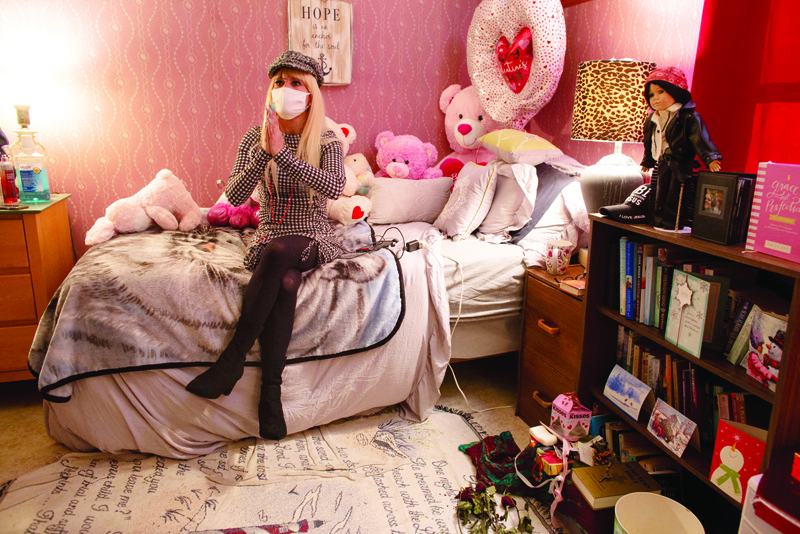 PATERSON, United States: Gloria gestures as she describes the abuse she suffered while speaking during an interview at the shelter "Strengthen Our Sisters" in Paterson, New Jersey .-AFP
PATERSON, United States: Gloria gestures as she describes the abuse she suffered while speaking during an interview at the shelter "Strengthen Our Sisters" in Paterson, New Jersey .-AFPPATERSON, United States: In New Jersey, at a timber farm turned shelter for women who have suffered domestic violence, Gloria's struggles, like those of many abuse victims, have worsened with the coronavirus pandemic. From Argentina to Singapore, virus-induced confinement has caused an increase in violence cases and their severity and made it more difficult to report abuses and help victims, activists say. Gloria, a 56-year-old New Yorker who is too afraid to give her surname, arrived at the Strengthen Our Sisters shelter six months ago, several months into the pandemic.
Before joining the center, which houses about 80 women and children in seven houses, Gloria first had to quarantine for two weeks, completely alone. Sitting in her pink- and red-painted bedroom, which is decorated with teddy bears, hearts, a Christmas tree, and a picture of Jesus, Gloria describes her ex-partner as "a monster" who beat her and forced her to work for him in exchange for drugs. "He had me isolated with him, without my family. He spoke very badly to me, he abused me very badly, and yet I still loved him," says Gloria, tears streaming from her piercing blue eyes.
Gloria, who has grown children from another relationship and several grandchildren, said her abuser would remove the phone, rip her clothes, force her to eat food she didn't want and call her a prostitute. "He said that I owed him my life and my body," said Gloria, the daughter of Puerto Rican parents, in Spanish. She is a former cocaine paste addict, who for a time lived on the streets of Coney Island, in Brooklyn. "The pandemic has exacerbated the ability of abusers to utilize power and control tactics over their intimate partners," said Connie Neal, executive director of the New York Coalition Against Domestic Violence.
Virtual services
Stay-at-home orders have caused household abuse to last longer and in many cases become more serious, said Cassie Mecklenburg executive director of Sheltering Wings, an organization that provides emergency housing to domestic violence survivors. The group is based in Danville, Indiana, a state where deaths caused by domestic violence surged 102 percent between the start of the pandemic in March and December. "People are having a harder time seeking services, but when they do finally have the opportunity to reach out, they're more serious," she told AFP.
A rise in unemployment and increased consumption of alcohol and drugs have also aggravated the situation, Mecklenburg notes. In April, the United Nations warned that violence against women during COVID-19 was a "shadow pandemic." It said cases in United States, Canada, Argentina, France, Britain and Spain increased during the first month of lockdown. "Numbers don't tell a whole story. Even with increases, we know that domestic violence is under-reported," said Tonya Harris, executive director of the Rhode Island Coalition against Domestic Violence. In her small state, calls for help have soared 90 percent since the start of the pandemic, fueling a demand for emergency shelter.
However, many American shelters had to limit occupants due to social distancing rules and quarantine rules. "It was very difficult to add more people to the house," says Cheryl Bullock-Hannah, a volunteer with the Strengthen Our Sisters shelter, which is funded almost entirely by donations. "You cannot go to social services. They are not open," she explains. "It's all done virtually, so it makes it very difficult." To help address the crisis in Chicago, Mayor Lori Lightfoot announced an agreement with Airbnb to temporarily house victims in the city.
'Obstacles'
But there are other problems. Attorney Victoria Goodlof says that due to COVID closing courts, survivors are no longer able to walk in and sometimes can't obtain a temporary restraining order on the same day. "(The delay) really could result in more danger," Goodlof, who works with the non-profit New York Legal Assistance Group told AFP.
Hearings for several of her clients trying to obtain permanent protection that were scheduled for March or April last year have not yet been given new dates. For survivors, the pandemic is "a very large mountain to climb" on a road that was "already full of obstacles," said Goodlof. "And that doesn't seem to be going away anytime soon," she added. - AFP










